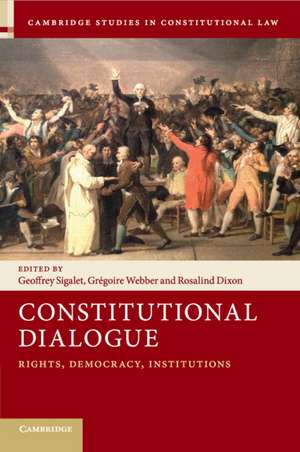Constitutional Dialogue: Rights, Democracy, Institutions: Cambridge Studies in Constitutional Law, cartea 21
Editat de Geoffrey Sigalet, Grégoire Webber, Rosalind Dixonen Limba Engleză Paperback – 25 noi 2020
| Toate formatele și edițiile | Preț | Express |
|---|---|---|
| Paperback (1) | 358.66 lei 6-8 săpt. | |
| Cambridge University Press – 25 noi 2020 | 358.66 lei 6-8 săpt. | |
| Hardback (1) | 895.68 lei 6-8 săpt. | |
| Cambridge University Press – mai 2019 | 895.68 lei 6-8 săpt. |
Din seria Cambridge Studies in Constitutional Law
-
 Preț: 229.90 lei
Preț: 229.90 lei -
 Preț: 201.00 lei
Preț: 201.00 lei -
 Preț: 171.43 lei
Preț: 171.43 lei -
 Preț: 188.09 lei
Preț: 188.09 lei -
 Preț: 238.02 lei
Preț: 238.02 lei -
 Preț: 322.29 lei
Preț: 322.29 lei - 14%
 Preț: 1013.47 lei
Preț: 1013.47 lei - 14%
 Preț: 732.54 lei
Preț: 732.54 lei - 14%
 Preț: 725.91 lei
Preț: 725.91 lei -
 Preț: 217.65 lei
Preț: 217.65 lei -
 Preț: 177.82 lei
Preț: 177.82 lei -
 Preț: 285.93 lei
Preț: 285.93 lei -
 Preț: 238.55 lei
Preț: 238.55 lei - 14%
 Preț: 698.61 lei
Preț: 698.61 lei -
 Preț: 320.17 lei
Preț: 320.17 lei - 14%
 Preț: 701.27 lei
Preț: 701.27 lei - 14%
 Preț: 724.92 lei
Preț: 724.92 lei -
 Preț: 312.14 lei
Preț: 312.14 lei -
 Preț: 285.16 lei
Preț: 285.16 lei -
 Preț: 359.63 lei
Preț: 359.63 lei - 14%
 Preț: 725.57 lei
Preț: 725.57 lei -
 Preț: 321.65 lei
Preț: 321.65 lei -
 Preț: 286.51 lei
Preț: 286.51 lei -
 Preț: 323.43 lei
Preț: 323.43 lei -
 Preț: 285.93 lei
Preț: 285.93 lei -
 Preț: 286.13 lei
Preț: 286.13 lei -
 Preț: 473.05 lei
Preț: 473.05 lei -
 Preț: 388.22 lei
Preț: 388.22 lei
Preț: 358.66 lei
Nou
Puncte Express: 538
Preț estimativ în valută:
68.63€ • 71.66$ • 56.67£
68.63€ • 71.66$ • 56.67£
Carte tipărită la comandă
Livrare economică 15-29 aprilie
Preluare comenzi: 021 569.72.76
Specificații
ISBN-13: 9781108405485
ISBN-10: 1108405487
Pagini: 485
Dimensiuni: 153 x 229 x 25 mm
Greutate: 0.64 kg
Editura: Cambridge University Press
Colecția Cambridge University Press
Seria Cambridge Studies in Constitutional Law
Locul publicării:New York, United States
ISBN-10: 1108405487
Pagini: 485
Dimensiuni: 153 x 229 x 25 mm
Greutate: 0.64 kg
Editura: Cambridge University Press
Colecția Cambridge University Press
Seria Cambridge Studies in Constitutional Law
Locul publicării:New York, United States
Cuprins
1. Introduction: the 'what' and 'why' of constitutional dialogue Geoffrey Sigalet, Grégoire Webber and Rosalind Dixon; Part I. Dialogue and Democracy: 2. Dialogue and its myths Alison Young; 3. Departmentalism and dialogue Jacob T. Levy; 4. On dialogue and domination Geoffrey Sigalet; Part II. Dialogue and Institutions: 5. Past, present, and justice in the exercise of judicial responsibility Grégoire Webber; 6. Dialogue and deference Rosalind Dixon; 7. Dialogue, finality, and legality Jeff King; Part III. Dialogue and Rights: 8. Canada's notwithstanding clause, dialogue, and constitutional identities Dwight Newman; 9. Intra-parliamentary dialogues in New Zealand and the UK Janet L. Hiebert and James B. Kelly; 10. Dialogue in Canada and the dangers of simplified comparative law and populism Kent Roach; 11. Bills of rights with strings attached: protecting the past from judicial review Rivka Weill; Part IV. Case Studies of Dialogue: 12. Prisoners' voting and judges' powers John Finnis; 13. 'All's well that ends well?' Same-sex marriage and constitutional dialogue Stephen Macedo; 14. A feature, not a bug: a co-ordinate moment in Canadian constitutionalism Dennis Baker; Part V. International and Transnational Dialogues: 15. Dialogue and its discontents Frederick Schauer; 16. Constitutional conversations in Britain (and Europe) Richard Ekins.
Descriere
Identifies how and why 'dialogue' can describe and evaluate institutional interactions over constitutional questions concerning democracy and rights.
